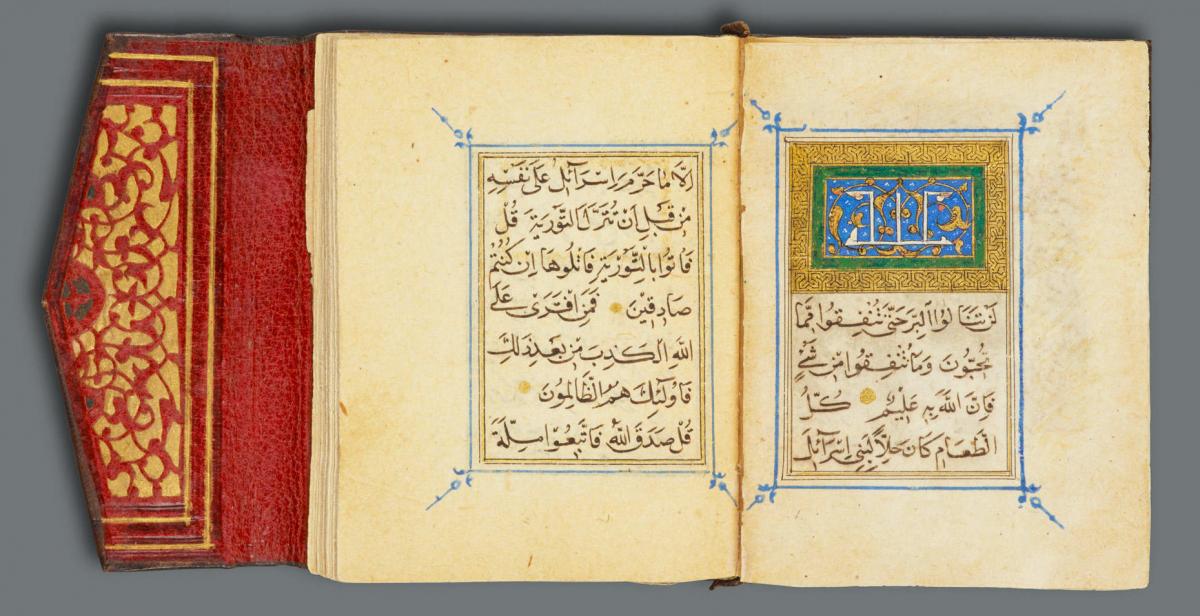Reflections Reading:
Significance of Ramadan
Tonight marks the beginning of the month of Ramadan on the Muslim calendar.
Ramadan is the holy month in which Prophet Muhammad (peace be upon him and his family) received the first revelation of the Holy Qur'an. All Muslims celebrate Ramadan as a month of special significance “in which the Holy Qur'an was sent down as a guide to humankind…” (2:185).

From Aga Khan Museum
The Revelation of the Holy Qur'an
The Prophet used to retreat from his everyday life in Mecca and go to the nearby mountains. He would do this for a month every year, only returning home to collect food and provision. There, he would stay alone, engaged in prayer, reflection and other acts of piety.
One night, while asleep during the month of Ramadan a figure appeared and commanded Prophet Muhammad to “recite” – “Iqra”! Uncertain, he responded, “what shall I recite?” The figure finally replied,
“Recite in the Name of your Lord, Who created, Created man from a clot. Recite, and your Lord is most generous, Who taught by the pen, Taught man that which he knew not.” (96:1-5)
According to Muslim tradition, this was the first revelation of the Qur’an-e Sharif to Prophet Muhammad. Because revelation commenced during Ramadan - and in keeping with Qur’anic direction, Muslims around the world consider it an auspicious month, dedicated to reflection, self-examination, purification and acts of piety. It is an opportunity for all us to commit to seek enlightenment of the spirit through prayer, fasting, remembrance of Allah, recitation of the Qur’an, and charitable support for those in need.
Fasting in Muslim Traditions
Fasting, or sawm in Arabic, generally refers to abstaining from food and drink throughout the day. In the Qur’an, Allah extends the practice of fasting prescribed to pre-Islamic communities, saying, “O believers, fasting has been prescribed for you as it was for those who preceded you, that you may be God-conscious” (2:183).
Fasting is meant to encourage God-consciousness, reflection, self-restraint, patience, and modesty by regulating our thoughts, desires, actions, and conduct in accordance with the ideals taught by the Prophet.
However, consistent with the teachings of many Muslim communities, for both Shi‘a and Sunni, practicing the outer form (zahir) of the fast is insufficient; one must also understand its inner meaning and purpose (batin). This means it is our responsibility to control our desires and avoid anything that may displease God. In this regard, Prophet Muhammad is reported to have said: “Whoever does not give up lying and evil actions, Allah is not in need of his leaving food and drink.”
The practice of fasting also reminds us of the blessings we enjoy and the plight of those whose quality of life is is far from acceptable. According to the Qur’anic verse mentioned earlier, the ultimate aim of fasting is taqwa, often translated as piety through God-consciousness at all times.
The physical fast is often challenging, but it is not meant to cause serious hardship. According to one hadith, which reinforces Qur’anic guidance, the Prophet advised a sick, elderly man to feed the poor and to fast only if possible. This suggests that there are alternative ways to sincerely practice sacrifice, restraint and devotion when physical fasting is not possible, such as charitable giving to the poor and working towards improving the quality of life of those amongst whom we live.
Conclusion
In Muslim tradition, Ramadan is a time of heightened commitment to piety and purification through special observances such as fasting, the performance of good deeds – including charitable giving and voluntary service – and through personal sacrifices of material comforts. These observances can lead to spiritual transformation, fulfillment and a sense of renewal.
As we individually and collectively try to reflect on the challenges we face in these uncertain times, the upcoming month of Ramadan offers tremendous potential and reservoir for fostering of strength, hope, gratitude and self-awareness.
Mawlana Hazar Imam emphasized many of these principles in his message to the global Jamat on May 23, 2020, on the occasion of Eid ul-Fitr, marking the end of Ramadan.
"It is my wish that my Jamat should look to the future with hope and courage, in keeping with its age-old tradition of unity, generosity and mutual support which has at all times enabled it to move forward to a position of enhanced strength and resilience, from generation to generation.
My spiritual children should always remain mindful that it is the principles of our faith that will bring peace and solace in these times of uncertainty. I am with my Jamat at all times, and each of you, individually, is always in my heart, in my thoughts and in my prayers.
I sent my most affectionate, paternal, maternal loving blessings to all my Jamat - for happiness, good health, confidence and security in your lives ahead, and for mushkil-asan."
Family Chat Questions
Why is Ramadan such an important month in Muslim history and consciousness?
What are the various ways by which we can individually and as a family observe the spirit and potential of this sacred month?
Learn More
Article: Ramadan
Reflections Reading: Holding Hands and Caring for Others
Article: Mayor Tory celebrates Iftar at the Ismaili Centre, Toronto
Video: Launch of the Big Iftar 2015 at Ismaili Centre, London
Aga Khan Museum Lecture: “The Moon: Mirror of Faith, Science, and the Arts” by Dr. Christiane Gruber
Opinions, statements, or other information displayed through external links above are provided as additional reference material and do not necessarily represent the opinions of, or imply endorsement by, the Ismaili Institutions for Canada.



